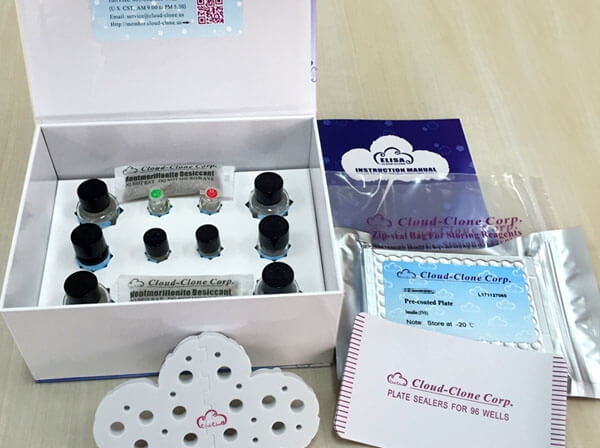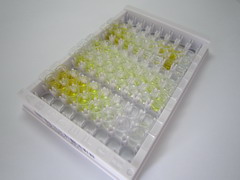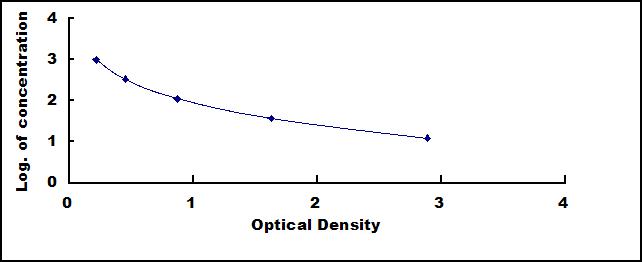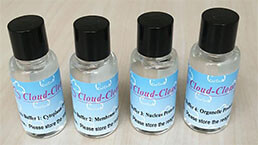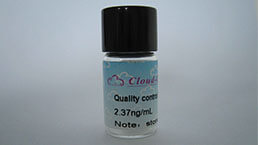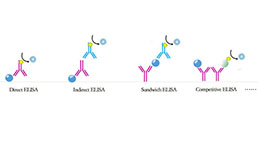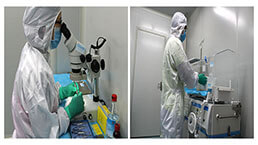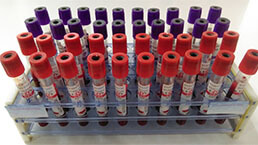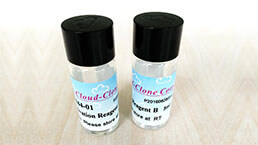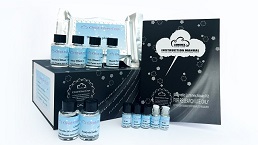ELISA Kit for Von Willebrand Factor (vWF) 

F8VWF; VWD; von Willebrand antigen 2
- UOM
- FOB US$ 479.00 US$ 684.00 US$ 3,078.00 US$ 5,814.00 US$ 47,880.00
- Quantity
Overview
Properties
- Product No.CEA833Rb
- Organism SpeciesOryctolagus cuniculus (Rabbit) Same name, Different species.
- ApplicationsEnzyme-linked immunosorbent assay for Antigen Detection.
Research use only - DownloadInstruction Manual
- CategorySignal transductionHematology
Sign into your account
Share a new citation as an author
Upload your experimental result
Review

Contact us
Please fill in the blank.
Recovery
Matrices listed below were spiked with certain level of recombinant Von Willebrand Factor (vWF) and the recovery rates were calculated by comparing the measured value to the expected amount of Von Willebrand Factor (vWF) in samples.
| Matrix | Recovery range (%) | Average(%) |
| serum(n=5) | 89-96 | 93 |
| EDTA plasma(n=5) | 95-103 | 101 |
| heparin plasma(n=5) | 87-94 | 90 |
Precision
Intra-assay Precision (Precision within an assay): 3 samples with low, middle and high level Von Willebrand Factor (vWF) were tested 20 times on one plate, respectively.
Inter-assay Precision (Precision between assays): 3 samples with low, middle and high level Von Willebrand Factor (vWF) were tested on 3 different plates, 8 replicates in each plate.
CV(%) = SD/meanX100
Intra-Assay: CV<10%
Inter-Assay: CV<12%
Linearity
The linearity of the kit was assayed by testing samples spiked with appropriate concentration of Von Willebrand Factor (vWF) and their serial dilutions. The results were demonstrated by the percentage of calculated concentration to the expected.
| Sample | 1:2 | 1:4 | 1:8 | 1:16 |
| serum(n=5) | 94-104% | 87-101% | 89-98% | 79-102% |
| EDTA plasma(n=5) | 87-95% | 85-95% | 79-99% | 88-95% |
| heparin plasma(n=5) | 91-98% | 78-102% | 78-98% | 96-104% |
Stability
The stability of kit is determined by the loss rate of activity. The loss rate of this kit is less than 5% within the expiration date under appropriate storage condition.
To minimize extra influence on the performance, operation procedures and lab conditions, especially room temperature, air humidity, incubator temperature should be strictly controlled. It is also strongly suggested that the whole assay is performed by the same operator from the beginning to the end.
Reagents and materials provided
| Reagents | Quantity | Reagents | Quantity |
| Pre-coated, ready to use 96-well strip plate | 1 | Plate sealer for 96 wells | 4 |
| Standard | 2 | Standard Diluent | 1×20mL |
| Detection Reagent A | 1 | Assay Diluent A | 1×12mL |
| Detection Reagent B | 1×120µL | Assay Diluent B | 1×12mL |
| Reagent Diluent | 1×300µL | Stop Solution | 1×6mL |
| TMB Substrate | 1×9mL | Instruction manual | 1 |
| Wash Buffer (30 × concentrate) | 1×20mL |
Assay procedure summary
1. Prepare all reagents, samples and standards;
2. Add 50µL standard or sample to each well.
And then add 50µL prepared Detection Reagent A immediately.
Shake and mix. Incubate 1 hour at 37°C;
3. Aspirate and wash 3 times;
4. Add 100µL prepared Detection Reagent B. Incubate 30 minutes at 37°C;
5. Aspirate and wash 5 times;
6. Add 90µL Substrate Solution. Incubate 10-20 minutes at 37°C;
7. Add 50µL Stop Solution. Read at 450 nm immediately.

Test principle
This assay employs the competitive inhibition enzyme immunoassay technique. A monoclonal antibody specific to Von Willebrand Factor (vWF) has been pre-coated onto a microplate. A competitive inhibition reaction is launched between biotin labeled Von Willebrand Factor (vWF) and unlabeled Von Willebrand Factor (vWF) (Standards or samples) with the pre-coated antibody specific to Von Willebrand Factor (vWF). After incubation the unbound conjugate is washed off. Next, avidin conjugated to Horseradish Peroxidase (HRP) is added to each microplate well and incubated. The amount of bound HRP conjugate is reverse proportional to the concentration of Von Willebrand Factor (vWF) in the sample. After addition of the substrate solution, the intensity of color developed is reverse proportional to the concentration of Von Willebrand Factor (vWF) in the sample.
Giveaways
Increment services
Citations
- Amorphous silica nanoparticles impair vascular homeostasis and induce systemic inflammationPubmed:Pmc4047982
- Systemic and Flap Inflammatory Response Associates with Thrombosis in Flap Venous CrisisPubmed:25448261
- Short-Term Nose-Only Water-Pipe (Shisha) Smoking Exposure Accelerates Coagulation and Causes Cardiac Inflammation and Oxidative Stress in MicePubmed:25634761
- Blood pH in coronary artery microthrombosis of ratsPubMed: 26522304
- Subchronic Toxicity and Cardiovascular Responses in Spontaneously Hypertensive Rats after Exposure to Multiwalled Carbon Nanotubes by Intratracheal InstillationPubMed: 25580880
- Differential integrative omic analysis for mechanism insights and biomarker discovery of abnormal Savda syndrome and its unique Munziq prescriptionPubmed:27296761
- Circulating endothelial cells, circulating endothelial progenitor cells, and von Willebrand factor in pregnancies complicated by hypertensive disordersdoi:10.1111
- Low-Dose Sodium Nitrite Fluid Resuscitation Prevents Lethality From Crush Syndrome by Improving Nitric Oxide Consumption and Preventing Myoglobin Cytotoxicity in Kidney in A Rat Model.pubmed:27941593
- The directional migration and differentiation of mesenchymal stem cells toward vascular endothelial cells stimulated by biphasic calcium phosphate ceramic10.1093/rb/rbx028
- Early prognostic factors in septic shock cancer patients: a prospective study with a proteomic approachPubmed:29315472
- Relationship between the von Willebrand Factor Plasma Concentration and Ultrasonographic Doppler Findings in Pregnancies Complicated by Hypertensive …Pubmed:29621786
- Role of Pigment Epithelium-Derived Factor in Arsenic-Induced Vascular Endothelial Dysfunction in a Rat ModelPubmed: 30392020
- Risk stratification and prognostic evaluation of endothelial cell‑specific molecule1, von Willebrand factor, and a disintegrin‑like and metalloprotease with …
- Association between Upper-airway Surgery and Ameliorative Risk Markers of endothelial function in obstructive Sleep ApneaPubmed: 31882827
- Waterpipe Tobacco Smoke Inhalation Triggers Thrombogenicity, Cardiac Inflammation and Oxidative Stress in Mice: Effects of FlavouringPubmed: 32075078
- Pigment epithelium-derived factor (PEDF) ameliorates arsenic-induced vascular endothelial dysfunction in rats and toxicity in endothelial EA. hy926 cellsPubmed: 32315827
- Xiaoyukang Jiaonang Promotes the Degradation of Hypoxia-Inducible Factor 1α and Antiangiogenesis and Anti-Inflammation in Chronic Subdural Hematoma …Pubmed: 32228124
- Enhanced Fibrin-Lysis in Grade-1 Dengue Haemorrhagic Fever
- Ad hatoda Vasica: a potential ayurvedic intervention against COVID-19 associated impaired immune response and hypoxia-inflammation phenotype
- Investigating the Multi-Faceted Nature of Radiation-Induced Coagulopathies in a G?ttingen Minipig Model of Hematopoietic Acute Radiation Syndrome34019667
- Preservation of renal endothelial integrity and reduction of renal edema by aprotinin does not preserve renal perfusion and function following experimental …34169407
- Salvianolic acid B improves the survival rate, acute kidney dysfunction, inflammation and NETosis‑mediated antibacterial action in a crush syndrome rat modelPubmed:35386617




